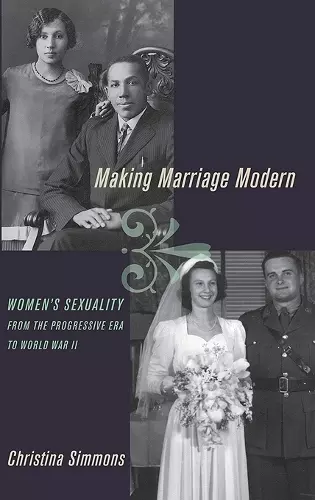Making Marriage Modern
Women's Sexuality from the Progressive Era to World War II
Format:Hardback
Publisher:Oxford University Press Inc
Published:23rd Apr '09
Currently unavailable, and unfortunately no date known when it will be back
This hardback is available in another edition too:
- Paperback£39.99(9780199874033)

Making Marriage Modern explains the fierce debates among whites and African Americans about American women's sexuality in the early twentieth century that set an older motherhood-centered ideal against a modern female style and produced a new conception of marriage that prevailed until the challenges of the Women's Liberation Movement. This contentious public conversation included social hygiene reformers in the 1910s anxious about venereal disease who called for scientific sex education but still hoped to prop up the motherhood ideal. At the same time birth control activists and sex radicals demanded women's right of choice over childbearing, rejected marriage, or asserted the right to interracial relationships or homosexuality. The book emphasizes the subsequent program of more conventional reformers, who by the 1920s hoped to contain the potential for women's independence from men and marriage portended by conditions of modern life. Their new vision, "companionate marriage," incorporated birth control, easier divorce, greater respect for wives, and an intensified sexual intimacy requiring women's active participation and pleasure. In its most popular version companionate marriage involved free-spirited flappers who did not seriously challenge male authority or women's ultimate focus on children and domesticity. The book also treats other more equitable versions. Feminists (white and black) proposed a more thoroughgoing equality of work and sex, and some African Americans promoted a "partnership marriage" that often included wives' employment. Feminist and more traditional perspectives also competed within the sexual advice literature that flooded onto the market in the 1930s. Making Marriage Modern argues that, despite the unsettling of an older femininity, deep and persistent structural inequalities between men and women limited efforts to create gender parity in sex and marriage. Yet these cultural battles also subverted patriarchal culture and raised women's expectations of marriage in ways that grounded second-wave feminist claims.
If you imagine that it took the sexual revolution of the 1960s to rumple the marriage bed, read this book--a very revealing, serious, and highly useful study of changes in thinking about sex and marriage before World War II. * Nancy F. Cott, author of Public Vows: A History of Marriage and the Nation *
In this important book, Christina Simmons insightfully examines the ideas and impact of intellectuals, novelists, advice writers, reformers, and radicals who forged a new vision of marital sexuality in the early twentieth century. In so doing, she illuminates the range of views--about heterosexual companionship, sexual knowledge, and female independence--that made marriage modern in the 1920s and 1930s, and continue to shape attitudes to the present day. * Kathy Peiss, author of Hope in a Jar *
In a carefully researched and crisply written account, Simmons reconstructs debates--about sex for pleasure, privacy for couples, and equality for women--that still have relevance for us today. A smart, engaging, and important book. * Joanne Meyerowitz, author of How Sex Changed: A History of Transsexuality in the United States *
Challenging both the myth of Victorian repression and the notion that it took women's liberation to transform the institution of marriage, Christina Simmons traces profound changes in sexual and marital relations from the 1910s through the 1940s. She analyzes debates over intimacy, privacy, freedom, and reciprocity among reformers, intellectuals, sex radicals, educators, therapists, physicians, novelists, and playwrights. Deeply researched and lucidly argued, Making Marriage Modern changes the terrain for all future discussions of marriage in the twentieth century. * Nancy A. Hewitt, Rutgers University *
Simmons' complex interpretation of white and African American sources maps a range of competing sexual ideals. Grounded in sex advice literature, marriage manuals, and reform tracts, this book will fascinate readers and provide important perspectives on contemporary debates over sex education, reproductive rights, and the changing definition of marriage. * Estelle B. Freedman, author of No Turning Back: The History of Feminism and the Future of Women. *
ISBN: 9780195064117
Dimensions: 163mm x 236mm x 33mm
Weight: 576g
320 pages